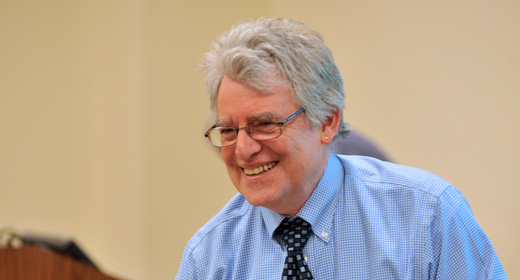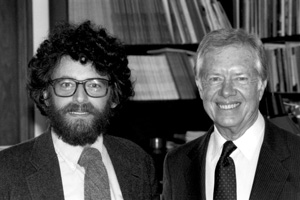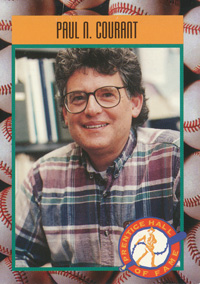
A conversation with Ford School professor Paul Courant, who has just returned to the school following an eight-month term as interim provost of U-M.
S&H: You've just completed your second stint in the Provost's office. Did you notice any differences this time around?
Courant: The biggest change is in the relationship between the university and society, rather than anything specific to the Provost's office. The university used to have a higher status within the community, but there's been a noticeable change. The extent to which the university is a trusted institution seems to be diminished.
S&H: What critiques did you see?
Courant: The public position, taken by many politicians, is that universities are actually worse than useless. If they were only useless, then they'd only be useless. But instead, they say universities are sources of politicized misinformation. And there's a notion that's widely reported that going to college isn't worth it financially. That's just wrong. And so, I think there's a fairly long list of, as Yogi Berra has been quoted, "lies that they tell about us that aren't even true."

S&H: For the bicentennial, you organized a panel discussion with leaders of some pretty impressive universities to talk about the evolution, or devolution, of the relationship between universities and society...
Courant: We tried to unpack this question: What has happened to the relationship between universities and society, and what can be done to make it better? These institutions, of which Michigan is exemplary, are tremendously important and valuable in producing a future for the country, for the world, for individuals and communities. And they're each making efforts to respond to these criticisms—to be more outward-facing, to engage with society and social problems, and to show the university's value.
S&H: Last fall, the day after the election, you hosted a panel here, and made a great case for the value universities bring...
Courant: Expertise matters, facts matter. Reliable prediction about the world matters. Getting things wrong in the long run, and often in the short run, is really lots worse than getting things right. That doesn't change. I absolutely believe that the things that we do in the university will continue to bring value to the world around us. At our best we are effective critics of ourselves, and our ability to serve society depends on our ability to be skeptical and to invite disagreement and argument.
S&H: And at the Ford School?
Courant: The vision that Pat Crecine and Herbert Simon and Tom Anton and Larry Mohr (MPA '63) and other Ford School faculty members articulated in the late 60s—that the rigorous application of science and social science to the world's problems could really improve the quality with which can deal with the world's problems—it was true then, it's true now.

S&H: As one of our longest-serving faculty members, what are your hopes for the future of the school?
Courant: Susan Collins did a remarkable job of making the school more visible in the world of policy. That trend needs to accelerate. So much of what the Ford School can do—so much of its ability to make the world better—comes from that visibility.
We have a faculty here that is very interested in the world, and very interested in their own disciplinary work. That combination is vital. I think that the Ford School's reputation, its brand if you will, has always been that we are more rigorous than many of the other institutions that engage in this kind of work. I think that's an important piece of brand to hold on to.
The other piece of the brand I'd want to hold on to is that we operate in the legacy of Gerald Ford, who was a decent guy who cared deeply about his country, who was totally committed to service, and who was quite capable of taking positions that were not consistent with the basic ideology of the people around him when he had better facts or simply thought they were the right thing to do.
S&H: Affirmative action, for example?
Courant: Affirmative action, very much. President Ford wrote a New York Times op-ed piece for the university's lawsuits around affirmative action and believed in it deeply. The logic of diversity, equity, and inclusion is essential to the success of both the University of Michigan and the Ford School.
If we're going to be the kind of institution that is an open-minded seeker of what works, we're going to have to bring to bear lots of points of view and lots of different people—that's diversity. We're going to have to allow those people a reasonable opportunity to affect the terms of the debate, and indeed the terms of the policy—that's equity. And we're going to have to allow everybody a place at the table—and that's inclusion.
Below is a formatted version of this article from State & Hill, the magazine of the Ford School. View the entire Fall 2017 State & Hill.